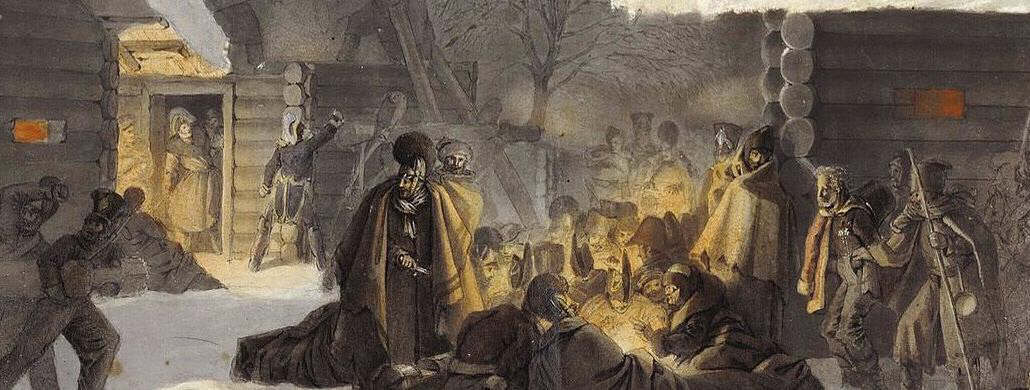
[Europe, 1812] Napoleon’s “Grande Armée”, reinforced by troops from Prussia, Austria and the Confederation of the Rhine, set out to invade Russia. The Bergmann brothers Heinrich and Niklas were among them.
Continental System
Since Napoleon could not conquer England, he intended to fight her by economic measures. Therefore, he decreeded the Continental system: no country was allowed to trade with England, no harbor was allowed to let English ships moor.
Although the Grand Duchy of Berg had close economic ties to France, Napoleon accepted its decline for the sake of his continental system. The Rhine was the customs border, also goods from Berg were classified as “hostile” and taxed at a high rate. As a result, Berg was cut off from the French and Dutch markets. Soon the economy had reached a lot, people impoverished, hunger and poverty spread.
Invasion of Russia
Johann in America feared for Hedy and her sons who served in Napoleon’s army, even more when he heard about Napoleons plan to invade Russia. “That plan is insane,” Johann thought. But Napoleon rode to Russia at the head of his “Grande Armée”, reinforced by contingents from Prussia, Austria, and the Confederation of the Rhine. The campaign ended in disaster. Napoleon himself escaped in a sleigh. Of his troops, only 18,000 returned home, of the 500 soldiers from Berg only about 190. General Yorck, commander of the Prussian regiments in the Grande Armée and a Prussian patriot, signed a truce with the Russian General Diebitsch (Convention of Tauroggen of December 30, 1812). It turned out to be thr start of the Wars of Liberation.
In summer 1813, Prussia, Great Britain, Sweden, Austria, and Bavaria stood against Napoleon. In the Battle of Leipzig on October 16-19, 1813, Napoleon’s army was defeated and had to retreat to France. The allies chased them and got to the Rhine, the Confederation of the Rhine fell apart. In the Great Duchy of Berg, the French top-ranking officials took the treasury and left. In reality, the Great Duchy did not exist anymore.
Days of anxious waiting
These were days of anxious waiting for Johann and his family. His daughter Jenny was a widow and his son James was inconsolable after his Library of Congress had been burned down. Moreover, he had not received any news from his family at the Rhine. Finally, he got a letter. Both Bergmann sons, Heinrich and Niklas, were among the few survivors of the Russian campaign, but they had suffered a lot, and Niklas had kept a stiff leg from a war injury. Nevertheless, both had fought in the Landsturm vom Siebengebirge together with a Prussian unit.
Waterloo and the Congress of Vienna (1814-15, Germany)
In January 1814, the French had to evacuate Cologne, in March 1814, the left bank of the Rhine was re-conquered. A little later the Allies rode into Paris. Napoleon had to abdicate and go into exile on the island of Elba. But the situation remained uneasy. At the Congress of Vienna 1814/15, the European statesmen debated over a new order, but did not come to an agreement. Instead, Napoleon acted. On March 1, 1815, he and some hundred men landed in southern France. Many people hailed him, and troops that should have fought him defected to him. Quickly the allies found an agreement and took up arms again. At Waterloo, Napoleon was defeated by the British and Prussians under Wellington and Blücher. He was exiled to St. Helena in the South Atlantic and died there in 1821.

Be the first to comment